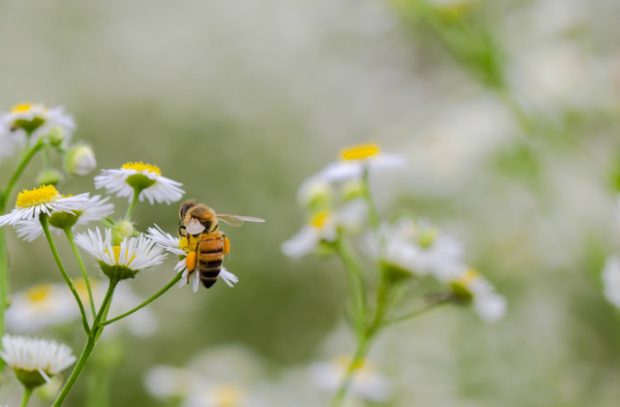
The Defra-coordinated annual Bees’ Needs Week kicked off today to highlight what everyone can be doing at home to care for bees and other pollinators.
There was positive coverage in The Daily Telegraph, Daily Express, Daily Star, Farming UK, Scottish Farmer and Horticulture Week reporting that gardeners as well as farmers and managers of urban green spaces are being encouraged to cut their grass less and let their gardens go wild to help bees, while also limiting pesticide use and growing more shrubs to help improve soil health and store carbon.
Bees’ Needs Week 2021 sees Defra and several green organisations including Buglife, the Royal Horticultural Society and Bumblebee Conservation Trust, working together to encourage everyone who can to do simple things at home, at work, and in other private and public spaces to help our precious pollinators thrive.
Environment Minister Rebecca Pow said:
Bees and other pollinators are not just a welcome and much loved sight in our gardens, parks, villages and countryside – they are vital to a healthy environment, driving our economy and boosting biodiversity.
Everyone can help them flourish by leaving patches of garden to grow wild, growing more flowers, cutting grass less often, not disturbing insect nests, and carefully considering how we use pesticides.
This is also one of the key messages of our recently launched ‘Plant for our Planet’ campaign - aimed at inspiring the public to support nature recovery by engaging in a variety of green activities to move us to a more sustainable future as we build back greener after the pandemic, and step up our efforts in tackling the climate crisis which is the focus of the COP26 summit.
Actions that we can take for pollinators and biodiversity will enable us to tackle and adapt to climate change – I encourage everyone to get involved.
Natural England CEO, Marian Spain said:
Without nature we could not live. Pollinators including bees especially show us this; holding the environment together by moving pollen between plants, enabling whole systems to be sustained and replenished, and ensuring vital food supplies for wildlife and people.
The importance of connecting with nature for our health and happiness has never been clearer. With such a growing public interest in the environment, I hope everyone can help support our wonderful and wild insect pollinators.
From changing the way you garden, to asking your council to leave long grass on road verges, parks and schools grounds, to using citizen science to learn even more about bees and other wildlife, we can all take part in Bees’ Needs Week and beyond.
Five simple actions everyone can take to help pollinators and make sure their populations are sustained are:
- Grow more flowers, shrubs and trees
- Let your garden grow wild
- Cut your grass less often
- Don’t disturb insect nest and hibernation spots
- Think carefully about whether to use pesticides
Another way people can help is by monitoring your local bee and pollinator populations. Spend 10 minutes in the sun to count insects for the UK’s Pollinator Monitoring Scheme (PoMS), and get involved on social media using #beesneeds.
This year’s Bees’ Needs Week follows the recent launch of Defra’s new campaign Plant for Our Planet, aimed at inspiring the public to get planting, helping us to build back greener from the pandemic and step up our efforts to tackle climate change and biodiversity loss. To get involved download our partner pack here.
2 comments
Comment by Dr.John Kirk posted on
I am a registered beekeeper, and find this so hypocritical after you legalised Neonicotinoids, what is being done to support beekeepers? Why not stop the importation of adulterated honey? This is just a ‘feel good factor’ to bolster a political image.
Comment by John Baxter posted on
The bee numbers are down substantially this year, we have no house martins this year and one pair of swallows instead of the twelve pairs we have had previously.
Maybe the Maltese and Sicilians, after 40 years in the EU were not lobbied enough by the U.K. to not shoot migrating birds, or could the fall in insects be partly due to recommendations by Defra to use glyphosate when establishing tree planting!.........one recommendation I refuse to follow,along with burning straw when we did not know any better.